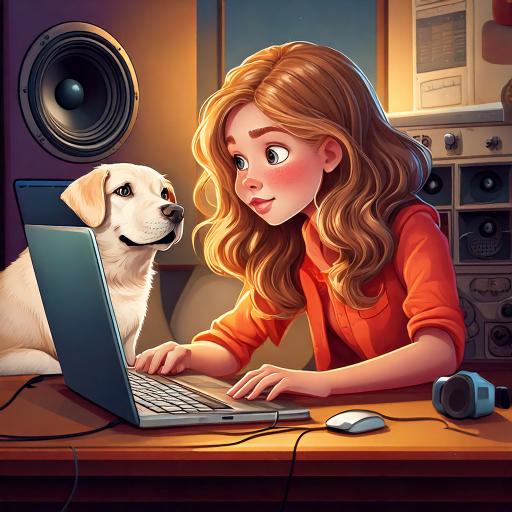

Month: December 2024
Welcome to the Busybird blog, where you can find helpful articles, updates, industry news and more. Make sure you stay up to date by signing up to our newsletter below.
Learning and Growing
December 17, 2024“You need to write a blog. It can be about anything.”

Those were the infamous words spoken, yet I still didn’t know what to write. I went through many examples and tried to come up with ideas, but nothing.
So as I stared at a blank page, the emptiness of it haunting me, an idea finally came: I decided to write about my experience and the environment here at Busybird.
It has not been what I had expected.
From the moment I walked in on the first day, being greeted by Oscar the Labrador at the door to walking through the shelves of books aligned on the walls, it is a chill and inviting environment.
And of course, how could I forget about the iconic 80s tunes playing in the background? Every now and then Les would ask me, “Who sings this?” to which sometimes I would respond with the right answer, but other times I would undoubtedly get it wrong and respond with, “Oh yeah I’ve heard this song before, but I’m unsure who sings this”, much to the horror of Les and Kev.
I didn’t know that studying 80s music was a requirement of the internship. Even though I have heard my parents listen to many of these songs, some of the names just never come to me.
Oscar the blond Labrador is a calm dog and very friendly, although Les constantly proceeds to call him a “doofus” and a “fiend”. It’s just his way of expressing his love for the dog, I guess. Oscar doesn’t seem phased by it. Most of the time Oscar just sits around and wants food.
The place is very bright with light coming in through the windows. There are many different items around, different plushies, pictures of Kev’s past travels, pictures of Oscar, Hawthorn footy memorabilia. (Kev is a big Hawthorn supporter), published books and posters.
Kev and Les always offer everyone a tea, coffee and maybe even a sweet treat. Everyone at Busybird is friendly and chatty.
I have learnt a lot so far here as an intern. My knowledge of editing, proofing, design and the publishing industry have expanded. I know that there is still much to learn and as I continue to learn and grow, I know that this is an experience that I will not forget.
Many thanks to Les and Kev.
Cristina Sirianni
Editing Intern
Nerd vs Academic
December 12, 2024If you are a reader, more often than not you are judged.
Judged by society.

Judged by those close to you.
Judged by yourself.
As a young reader discovering the beauty of the written word, it is difficult to navigate the world of books, especially when flying solo into the readership community. This can often lead to misunderstanding of personal likes and dislikes, and difficulty finding and choosing the right authors and books to read.
As we get older, this daunting process eases in its difficulty, as we’re more aware of our reading habits, favoured genres and writing styles. And by this point in our life, we don’t allow the judgement of others to affect our hobbies.
But it is the judgement we receive as young people, as primary schoolers, that impact our development in personal, academic and social situations.
When we are young and not surrounded by passionate readers (as we might be today), we are made to feel different. To stand out from the crowd for liking something many others do not like. We are made to feel like nerds because who else, apart from a nerd, would genuinely like books and reading? So when I was younger, like many other young people who didn’t know any better back then, I labelled myself a nerd. Especially because my love of the fantasy genre started from a young age.
But why should I put a label on myself just for liking something?
As we enter the high school era, a similar thing happens to us. By this point, we’ve come into our own and accept our love for reading. But those habits start to bleed into our academic life and once again, we’re labelled something based on our habits; not only are we nerds, but we’re teacher’s pets because we take our education seriously.
When will this judgement end?
By the time we reach university, if that is the path we take, we’ve become resilient enough to allow labels not to define us. But they always haunt the back of our minds, reminding us that once upon a time, our reading journey was frowned upon because it didn’t fit in with the norm of the other kids.
We shouldn’t have to hide our passions.
Creativity and a love of writing often go hand in hand with a love of reading. When I was young and someone asked me what I wanted to do in the future, I told them I wanted to become an author. I didn’t let the judgement and misunderstanding of my passion get in the way of people being unable to comprehend what I wanted to do.
So I took it further. Now, with a Bachelor’s Degree and Masters Degree in Writing and Publishing, I continue to advocate for passionate readers and writers by helping them bring their stories to life.
An internship at Busybird Publishing has been but one step in my journey. The team accept you in as one of their own, showing you all the facets of self-publishing and allowing you to hone your diverse skills. And not to mention, Oscar’s constant furry, stress-relieving and playful presence tops the experience off.
So I leave you with this: don’t let the words of others change who you are.
Whether you are nerd, academic, avid reader, aspiring writer or editor, run with your passions and let them fly.
Rebecca Cannizzaro
Thursday intern
What does a final draft look like?
December 5, 2024Artists often remark that the skill of a good artist is knowing when you are done. The same applies to a book. Regardless of whether it is a novel or a work of non-fiction, knowing when a manuscript is done is part of the skill of both good writing and editing. In both cases it can be tempting to keep tweaking the language – maybe changing the name of a character or updating the statistics, but at some stage you need to say, ‘I am done.’

Equally, at what point is a book ready for editing?
If it is your first book or you are finding it hard to keep on track, having an editor involved from the beginning can be useful. Some editors will offer developmental editing or coaching and they can help you keep on track or make sure your writing accurately reflects what you want to say. There is nothing worse than finishing what you hope is the last draft of your 80,000-word novel only to realise it would have been better written in a different point of view, or one of the key characters is very flat and boring so needs re-writing.
It happens.
Developmental editing means you are spending more time working with your editor so you should develop a strong working relationship with them. They will have a very clear understanding of what you are capable of as a writer and the book you are working on. The extra cost of working with a highly experienced editor should be recouped by reducing the amount of time it takes to write your book and in the quality of your writing (and hopefully increased sales as a result). Any misspellings or incorrect use of grammar are usually picked up in the process so your manuscript will spend less time being copy-edited and proofread.
If you are writing in a language other than your mother tongue, it is worth asking a language teacher to look over your work, or at least someone who is proficient in the language you have written in. They can help explain why some of your word choices may need to be amended. While an editor’s role is to review your language use, their primary focus is on the efficiency of that language to deliver the story or information you are conveying. If they struggle to understand what you are trying to say because your command of that language is not strong it is frustrating and very time consuming for the editor. As a result, you may not get the best edit, or it will cost you a great deal of money in editing. Why not workshop your manuscript first with a writing group or in a language class?
Read your final draft out loud. It may not be a screenplay but when we read aloud our brain is not filling in the gaps that sometimes happens when you read in your head. Reading your work aloud or having someone read it to you (think AI) may help you pick up where you can improve the clarity of your language or where something is missing in your story. Maybe you have written a manual; listening to instructions often picks up a missing step in a process. It helps!
When you have typed what you hope is the last word, put the manuscript away for a few days. Forget about it for a day or two, maybe even a week or more. Then come back with fresh eyes. You may find you are more critical of what you have written and start crafting an even better draft. You may even surprise yourself and think, Hey, this is good!
It is also essential to ask someone else to read it, but preferably not one of your friends. They are usually reluctant to be too critical, you are their friend and that friendship will always take precedence over being your critic. Don’t be shy! You are writing a book – people will read it someday. Reach out to your network. Alternatively, you could ask your local Writer’s Centre, (Writers’ Victoria, Writing NSW, TasWriters, etc.) will help you, they can also connect you with a writers’ group or Beta Readers.
Once you have finished your final draft there are a number of additional steps that need to happen before you can add your book to your bookshelf.
After editing has been completed your manuscript needs to be typeset, usually using InDesign. This is graphic design software and not only lays out the text in a way that is unique to a book and allows for the insertion of design elements such as graphics or photos. The cover is also designed in InDesign as well.
To allow for smooth typesetting it is useful to have an idea of what you want your book to look like. However, your final draft should contain text only, any images to be inserted need to be in a separate file with the insertion point indicated in the manuscript and cross referenced in the name of the image. It is okay to give your typesetter a copy of what you are hoping the final design will look like. As with editing, if you want a professional outcome, typesetting and design are specialised skills, you will need help.
Your final draft may be your third draft, it may even be your twentieth, you will know when you have come to the point when you are just procrastinating.
Hopefully you will know when you are done – it should be the best you think it can be.
Amanda McMahon
Monday Intern
Amanda McMahon Editing
